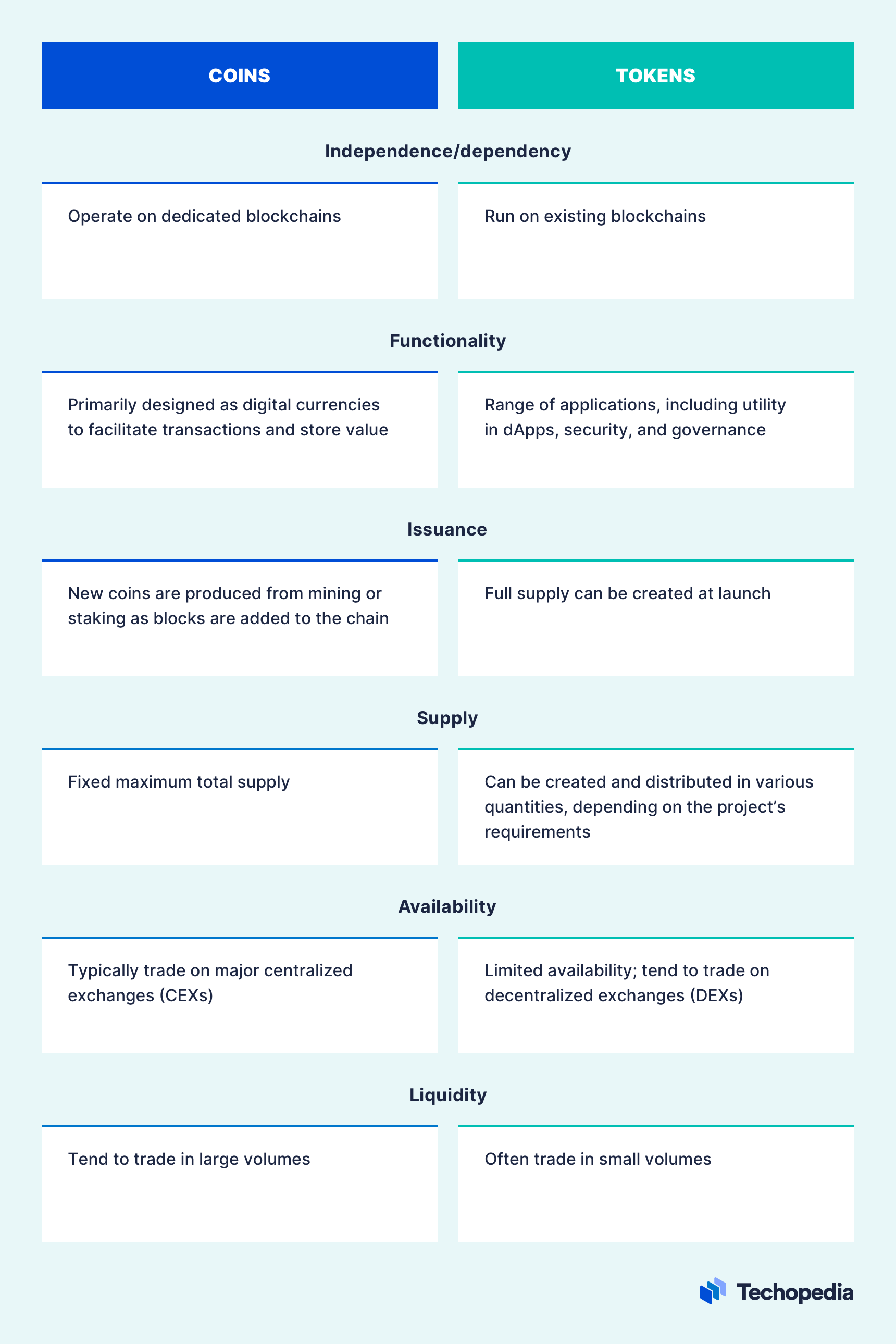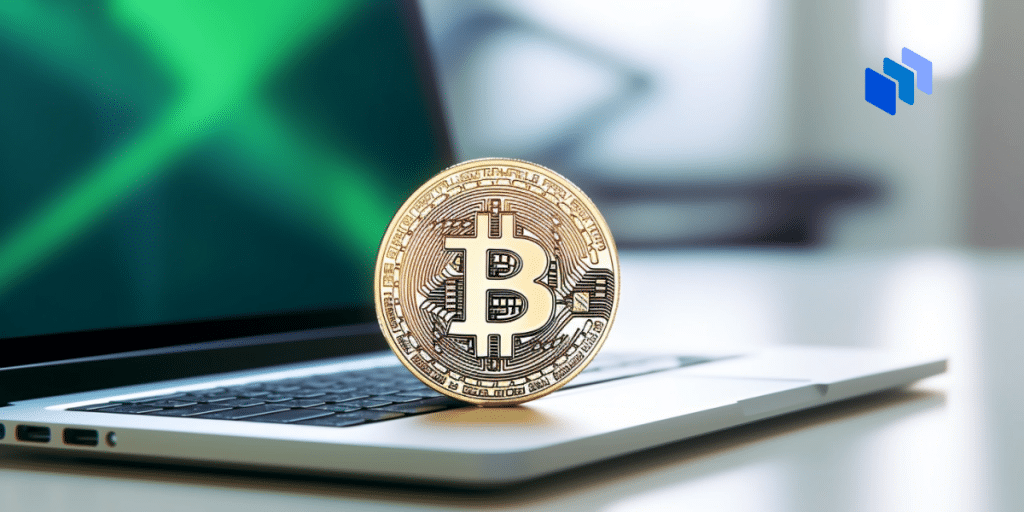Cryptocurrencies have introduced new forms of digital assets that operate on blockchain technology. Blockchains are decentralized, distributed ledgers that serve as a public record of all transactions with the aim of ensuring immutability, transparency, and security.
Cryptocurrencies that run on them are decentralized, as there is no issuing authority, and transactions are managed by code. Using cryptography, an advanced encryption technology, protects the network and limits the potential for double spending, counterfeiting, or other types of fraud.
There are two types of cryptocurrencies: coins and tokens. While the terms are often used interchangeably, coins and tokens have distinct characteristics and serve different purposes.
What are the similarities and differences between crypto coins and tokens, and what are some real-world uses?
What Are Crypto Coins?
Cryptocurrency coins are independent digital currencies that run autonomously on their own blockchain networks.
Coins typically act as a store of value or a medium of exchange, meaning that they are used as payment for goods and services.
The blockchain protocol creates and issues new coins each time that miners in proof-of-work (PoW) networks or validator nodes on proof-of-stake (PoS) networks validate new blocks and add them to the chain. The coins are known as native to the blockchain protocol. For instance, Ether (ETH) is the native coin of the Ethereum blockchain.
Most cryptocurrency coins have a limited maximum supply, which aims to create the scarcity that will potentially lead to value appreciation over time. For instance, Bitcoin (BTC) – the first and largest cryptocurrency by market capitalization – has a maximum supply of 21 million coins. Once it reaches that cap, no more BTC will be mined.
What Are Crypto Tokens?
Cryptocurrency tokens are digital assets that run on top of an existing blockchain network.
Tokens are more diverse in their functionality than coins: they can serve various purposes, including utility in decentralized applications (dApps), security, and governance.
Smart contracts running on blockchain networks define the way that tokens function. There are several popular token standards that define their functionality, such as:
- ERC-20, which is used to create tokens on the Ethereum blockchain;
- BEP-20, which is used for tokens on Binance’s BNB Chain.
Tokens based on these standards can interact with the ecosystem of dApps on the respective blockchains.
The total supply of a token is often created at launch, and a certain amount is distributed through initial coin offerings (ICOs) or token sales.
What Are the Key Differences Between Crypto Coins and Tokens?
What Are Some Examples of Coin and Token Usage?
The most popular cryptocurrencies on the market illustrate the differences in the way that coins and tokens function.
Popular Cryptocurrency Coins
Bitcoin (BTC)
Bitcoin operates on its own dedicated blockchain and has a maximum supply that contributes to its status as a store of value. Bitcoin is often referred to as “digital gold” and has become an asset class for investors looking to diversify their portfolios beyond stocks, bonds, and other assets.
Bitcoin is also used by individuals and businesses as a form of payment. An increasing number of merchants and service providers have begun to accept Bitcoin, including AMC, Gamestop, Microsoft, NewEgg, Overstock, PayPal, Shopify, and Twitch.
Ether (ETH)
Ether is the native cryptocurrency coin for the Ethereum blockchain, which also hosts a large number of tokens. The largest “altcoin”, or alternative to Bitcoin, Ethereum has become popular among investors who expect its value to appreciate over time as the use of the blockchain for dApps grows.
Ethereum is accepted as a form of payment by companies including AMC, Microsoft, NewEgg, Overstock, PayPal, and Twitch.
Litecoin (LTC)
Created as a hard fork, or spinoff, from Bitcoin, Litecoin is another cryptocurrency that primarily operates as a store of value and method of payment.
Companies that accept Litecoin include AMC, Overstock, and PayPal, among others.
Popular Cryptocurrency Tokens
Shiba Inu (SHIB)
Shiba Inu is one of the most popular “meme coins” – cryptocurrencies based on fun Internet memes that have been adopted by online communities. SHIB is a token that runs on the Ethereum blockchain. It acts as a utility token within the ShibaSwap ecosystem. Token holders can use their SHIB for various functions within the ecosystem, such as providing liquidity, staking, or voting on proposals.
The token was created with a maximum total supply of 1 quadrillion tokens, although half of these have been burned or destroyed. There are still 500 trillion tokens in circulation. The Shiba Inu ecosystem has expanded with two other tokens, LEASH and BONE, which are used for governance and loyalty rewards, respectively.
Polygon (MATIC)
MATIC is an ERC-20 token on the Ethereum blockchain. It is the native cryptocurrency for the Polygon blockchain, which is a Layer 2 scaling solution that runs alongside the Ethereum blockchain to increase its transaction processing speeds while reducing fees.
MATIC is used within the Polygon ecosystem to pay transaction fees when interacting with dApps and smart contracts. MATIC is a unit of value and exchange within the ecosystem, as developers can use the token to incentivize users, access services, and power functionality within their dApps.
MATIC holders can stake their tokens to become validators on the Polygon network, receive rewards, and vote on governance proposals. In addition, users can transfer assets between the Ethereum and Polygon blockchains using the Polygon Bridge with MATIC as the bridge currency.
Uniswap (UNI)
UNI is an ERC-20 token on the Ethereum blockchain. It is the utility and governance token for the Uniswap decentralized exchange (DEX) that runs on the blockchain. UNI token holders can vote on proposals and earn rewards for contributing their tokens to liquidity pools.
UNI can also be used on the Uniswap DEX in a trading pair or as an intermediary currency for token swaps, allowing traders to easily exchange their assets on a decentralized and permissionless platform.
Key Takeaways
Understanding the difference between cryptocurrency coins and tokens is crucial to navigating the cryptocurrency space. While coins primarily function as digital currencies, tokens have a range of functionalities depending on the protocol and the aims of the network.
Crypto coins such as BTC and ETH operate on their own blockchains, while tokens such as SHIB and UNI run on Ethereum. Coins often have limited supply and high liquidity, unlike tokens. Meanwhile, tokens can have several different functions tailored to the specific network protocol.
Grasping these differences can help users and investors make informed decisions about their involvement with cryptocurrencies and blockchain-based projects.








